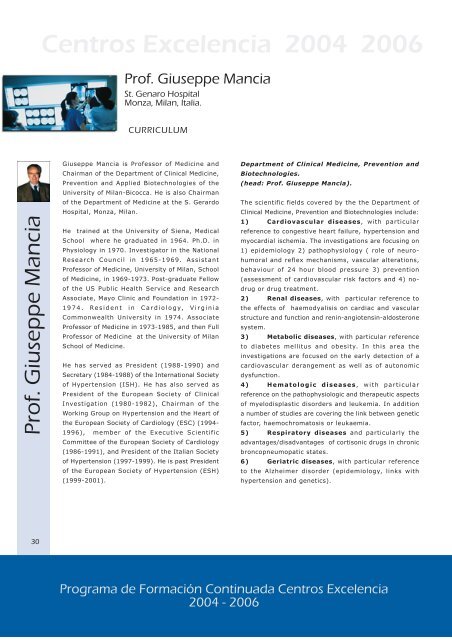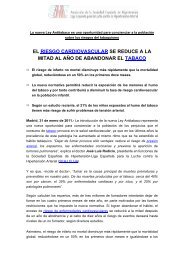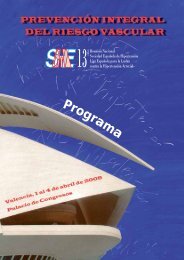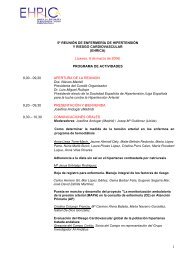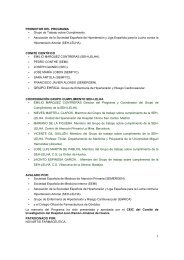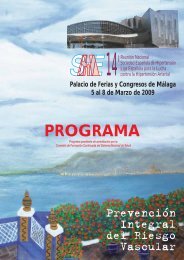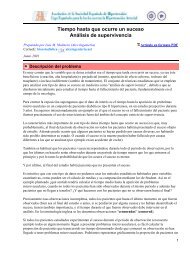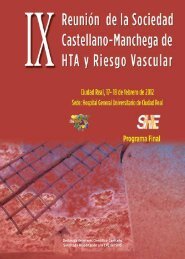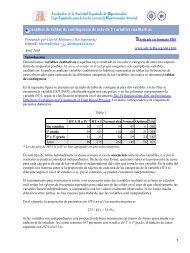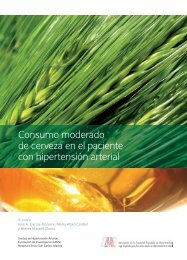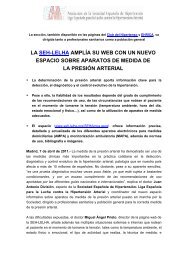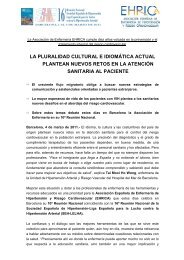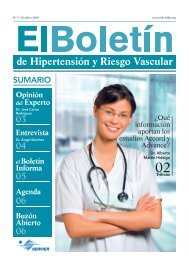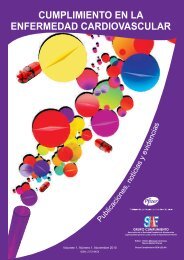Nuevo R1 12-07-04 by feli.FH11 - SEH-LELHA
Nuevo R1 12-07-04 by feli.FH11 - SEH-LELHA
Nuevo R1 12-07-04 by feli.FH11 - SEH-LELHA
- No tags were found...
Create successful ePaper yourself
Turn your PDF publications into a flip-book with our unique Google optimized e-Paper software.
Centros Excelencia 20<strong>04</strong> 2006Prof. Giuseppe ManciaSt. Genaro HospitalMonza, Milan, Italia.CURRICULUMProf. Giuseppe ManciaGiuseppe Mancia is Professor of Medicine andChairman of the Department of Clinical Medicine,Prevention and Applied Biotechnologies of theUniversity of Milan-Bicocca. He is also Chairmanof the Department of Medicine at the S. GerardoHospital, Monza, Milan.He trained at the University of Siena, MedicalSchool where he graduated in 1964. Ph.D. inPhysiology in 1970. Investigator in the NationalResearch Council in 1965-1969. AssistantProfessor of Medicine, University of Milan, Schoolof Medicine, in 1969-1973. Post-graduate Fellowof the US Public Health Service and ResearchAssociate, Mayo Clinic and Foundation in 1972-1974. Resident in Cardiology, VirginiaCommonwealth University in 1974. AssociateProfessor of Medicine in 1973-1985, and then FullProfessor of Medicine at the University of MilanSchool of Medicine.He has served as President (1988-1990) andSecretary (1984-1988) of the International Societyof Hypertension (ISH). He has also served asPresident of the European Society of ClinicalInvestigation (1980-1982), Chairman of theWorking Group on Hypertension and the Heart ofthe European Society of Cardiology (ESC) (1994-1996), member of the Executive ScientificCommittee of the European Society of Cardiology(1986-1991), and President of the Italian Societyof Hypertension (1997-1999). He is past Presidentof the European Society of Hypertension (ESH)(1999-2001).Department of Clinical Medicine, Prevention andBiotechnologies.(head: Prof. Giuseppe Mancia).The scientific fields covered <strong>by</strong> the the Department ofClinical Medicine, Prevention and Biotechnologies include:1) Cardiovascular diseases, with particularreference to congestive heart failure, hypertension andmyocardial ischemia. The investigations are focusing on1) epidemiology 2) pathophysiology ( role of neurohumoraland reflex mechanisms, vascular alterations,behaviour of 24 hour blood pressure 3) prevention(assessment of cardiovascular risk factors and 4) nodrugor drug treatment.2) Renal diseases, with particular reference tothe effects of haemodyalisis on cardiac and vascularstructure and function and renin-angiotensin-aldosteronesystem.3) Metabolic diseases, with particular referenceto diabetes mellitus and obesity. In this area theinvestigations are focused on the early detection of acardiovascular derangement as well as of autonomicdysfunction.4) Hematologic diseases, with particularreference on the pathophysiologic and therapeutic aspectsof myelodisplastic disorders and leukemia. In additiona number of studies are covering the link between geneticfactor, haemochromatosis or leukaemia.5) Respiratory diseases and particularly theadvantages/disadvantages of cortisonic drugs in chronicbroncopneumopatic states.6) Geriatric diseases, with particular referenceto the Alzheimer disorder (epidemiology, links withhypertension and genetics).30Programa de Formación Continuada Centros Excelencia20<strong>04</strong> - 2006


